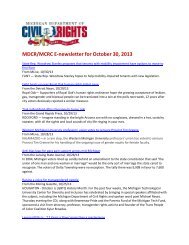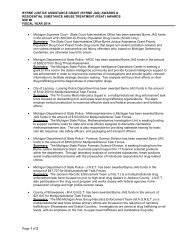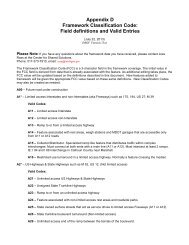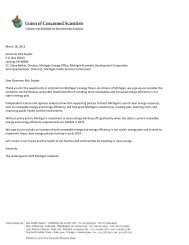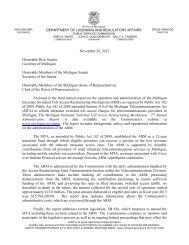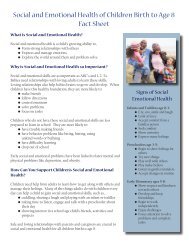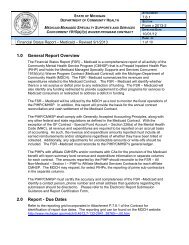michigan hypertension core curriculum - State of Michigan
michigan hypertension core curriculum - State of Michigan
michigan hypertension core curriculum - State of Michigan
Create successful ePaper yourself
Turn your PDF publications into a flip-book with our unique Google optimized e-Paper software.
and maternal morbidity and mortality. A severe and dangerous variant <strong>of</strong> preeclampsia is the HELLP<br />
(hemolysis, elevated liver enzymes, low platelets) syndrome, which occurs in 1 <strong>of</strong> 1,000 pregnancies.<br />
Preeclampsia Superimposed on Chronic Hypertension<br />
The incidence <strong>of</strong> preeclampsia in women with chronic <strong>hypertension</strong> is about 15% to 25%,<br />
compared with 5% <strong>of</strong> pregnancies in women without preexisting <strong>hypertension</strong>. A diagnosis <strong>of</strong><br />
superimposed preeclampsia is made when de novo proteinuria develops in the latter half <strong>of</strong> pregnancy<br />
or when the <strong>hypertension</strong> accelerates greatly in the last trimester. The rise in BP is SBP > 30 mm Hg<br />
or DBP > 15 mm Hg plus proteinuria and/or edema. The recurrence rate in subsequent pregnancies is<br />
high.<br />
Risk Factors<br />
Risk factors for preeclampsia have been studied extensively as preeclampsia is the hypertensive<br />
disorder <strong>of</strong> pregnancy most commonly associated with severe complications.<br />
Risk Factors<br />
Nullipara<br />
First baby before the age <strong>of</strong> 20 or after 35<br />
Hypertension before pregnancy<br />
Having multiple births<br />
African descent<br />
Family History <strong>of</strong> pregnancy induced <strong>hypertension</strong><br />
Chronic kidney disease, diabetes mellitus<br />
Obesity (BMI > 30)<br />
1. Race or ethnicity: The risk associated with race or ethnicity is uncertain. Black women have<br />
higher rates <strong>of</strong> preeclampsia complicating their pregnancies compared to other racial groups,<br />
mainly because they have a greater prevalence <strong>of</strong> underlying chronic <strong>hypertension</strong> and greater<br />
obesity. A recent prospective study 4 , identified a significantly increased risk <strong>of</strong> preeclampsia and<br />
decreased risk <strong>of</strong> gestational <strong>hypertension</strong> among Hispanic women relative to non-Hispanic<br />
Caucasians.<br />
2. Primigravid pregnancy and history <strong>of</strong> preeclampsia during previous pregnancies: Although the<br />
underlying causative factors are not completely delineated, <strong>hypertension</strong> in preeclampsia is<br />
clearly a consequence <strong>of</strong> a generalized arterial vasoconstriction. Primigravidas have increased<br />
risk for preeclampsia. However, women with a history <strong>of</strong> preeclampsia have an increased<br />
risk during subsequent pregnancies. Other risk factors include extremes <strong>of</strong> reproductive age,<br />
obesity, family history <strong>of</strong> preeclampsia, chronic <strong>hypertension</strong>, diabetes mellitus, the presence<br />
<strong>of</strong> trophoblastic disease, multiple gestations, mother’s own low birth weight, prematurity, and<br />
young age, connective tissue disease, and kideny disease.<br />
3. Stress and socioeconomic status: Although traditionally considered risk factors, a recent<br />
prospective community-based cohort study 5 did not show any association <strong>of</strong> work stress,<br />
anxiety, depression or pregnancy-related anxiety early in pregnancy to the development <strong>of</strong><br />
gestational <strong>hypertension</strong> or pre-eclampsia later in pregnancy. A recent study suggested that<br />
SSRI exposure during late pregnancy may identify women who are at an increased risk for<br />
gestational <strong>hypertension</strong> and preeclampsia. 6 A few studies that examined the association<br />
NKFM & MDCH 261




